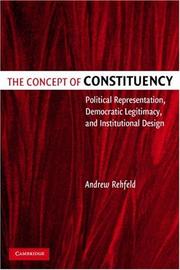| Listing 1 - 2 of 2 |
Sort by
|
Dissertation
ISBN: 2247099084 Year: 2005 Publisher: Paris : Dalloz,
Abstract | Keywords | Export | Availability | Bookmark
 Loading...
Loading...Choose an application
- Reference Manager
- EndNote
- RefWorks (Direct export to RefWorks)
Pouvoir constituant. --- Séparation des pouvoirs. --- Droit constitutionnel.

ISBN: 9780521849845 9780521057325 0521849845 9780511509674 0511130414 9780511130410 0511128231 9780511128233 0511509677 1280416238 9781280416231 0521057329 1107153425 0511182082 0511199309 051130000X 0511128886 Year: 2005 Publisher: Cambridge : Cambridge University Press,
Abstract | Keywords | Export | Availability | Bookmark
 Loading...
Loading...Choose an application
- Reference Manager
- EndNote
- RefWorks (Direct export to RefWorks)
In virtually every democratic nation in the world, political representation is defined by where citizens live. In the United States, for example, Congressional Districts are drawn every 10 years as lines on a map. Why do democratic governments define political representation this way? Are territorial electoral constituencies commensurate with basic principles of democratic legitimacy? And why might our commitments to these principles lead us to endorse a radical alternative: randomly assigning citizens to permanent, single-member electoral constituencies that each looks like the nation they collectively represent? Using the case of the founding period of the United States as an illustration, and drawing from classic sources in Western political theory, this book describes the conceptual, historical, and normative features of the electoral constituency. As an institution conceptually separate from the casting of votes, the electoral constituency is little studied. Its historical origins are often incorrectly described. And as a normative matter, the constituency is almost completely ignored. Raising these conceptual, historical and normative issues, the argument culminates with a novel thought experiment of imagining how politics might change under randomized, permanent, national electoral constituencies. By focusing on how citizens are formally defined for the purpose of political representation, The Concept of Constituency thus offers a novel approach to the central problems of political representation, democratic legitimacy, and institutional design.
Government --- Political sociology --- Political systems --- Representative government and representation. --- Constituent power. --- Representative government and representation --- Constituent power --- Constitutional law --- Legislative power --- Parliamentary government --- Political representation --- Representation --- Self-government --- Constitutional history --- Political science --- Democracy --- Elections --- Republics --- Suffrage --- Social Sciences --- Political Science --- Régime représentatif --- Pouvoir constituant --- États-Unis
| Listing 1 - 2 of 2 |
Sort by
|

 Search
Search Feedback
Feedback About
About Help
Help News
News